
Gurley Brewer (1866-1919) was an American attorney, newspaper publisher, and political activist. Brewer is best remembered as the editor of the Indianapolis World, one of the first African American newspapers in the state of Indiana.

Gurley Brewer (1866-1919) was an American attorney, newspaper publisher, and political activist. Brewer is best remembered as the editor of the Indianapolis World, one of the first African American newspapers in the state of Indiana.
Gurley Brewer was born in Indianapolis, Indiana in 1866, the son of Hubbard Brewer, a barber, and his wife. [1] The family moved to the town of Vincennes when Gurley was a small boy. [1]
Brewer was a graduate of Wilberforce University, a historically black college affiliated with the African Methodist Episcopal Church, located in Wilberforce, Ohio. [2] He graduated with honors in 1888. [3]
A talented public speaker, in 1888 Brewer toured the state of Indiana on behalf of Republican Presidential candidate Benjamin Harrison at the request of the Indiana Republican State Central Committee. [3] Brewer would regularly speak on behalf of the Republican Party during political campaign season for the rest of his life.
Brewer was admitted to the Indiana state bar as a practicing attorney in February 1890, becoming the first African-American man ever admitted to bar in Southern Indiana. [2] He opened up a practice in his hometown of Vincennes.
Brewer also served as the principal of the segregated "colored schools" of Mt. Vernon, Indiana from 1894 to 1897. [4]
In 1900 Brewer was named Deputy State Historian of Indiana. [5] He was also a Deputy State Statistician in that year and was elected an alternate delegate to the 1900 Republican National Convention. [6]
From the first years of the 20th Century Brewer was editor of the Indianapolis World, one of the first black newspapers in the state of Indiana. Brewer frequently took a conservative editorial line, in editorializing in 1903 in favor of the Negro Business League, a group formed in Indianapolis to remove disaffected and unemployed blacks from the community, with a view to assuaging troubled race relations. In July 1903 Brewer publicly declared:
It is very easy to determine who the shiftless, worthless negroes are, for they are found almost altogether in the Indiana Avenue district. Agents of the Negro Business League will make inquiry concerning them, and those who will not work will be reported to the authorities with a request that they be driven out of town. [7]
Brewer became co-publisher of the World with Alexander Manning in 1904, remaining at the helm until 1912. [8] In this capacity he was active in the National Negro Press Association, of which he was elected Second Vice President in 1913. [9]
A staunch supporter of the Republican Party, Brewer backed the conservative William Howard Taft in the controversial 1912 election against the progressive campaign of former Republican President Theodore Roosevelt. [10]
Early in 1919 Brewer was named Indiana Deputy State Oil Inspector. [5]
Gurley Brewer died at his home in Indianapolis of a heart attack on March 30, 1919. [11] He was 53 years old at the time of his death. [5]
A memorial service was held for Brewer on April 4, 1919, a gathering addressed by prominent Republicans including Indiana Governor James P. Goodrich and Indianapolis Mayor Charles W. Jewett. [12]

John Downey Works was a U.S. Senator representing California from 1911 to 1917, and an Associate Justice of the California Supreme Court from October 2, 1888, to January 5, 1891.
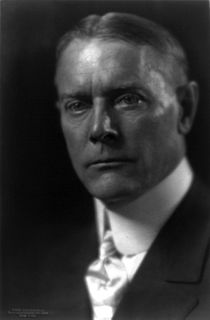
Albert Jeremiah Beveridge was an American historian and US senator from Indiana. He was an intellectual leader of the Progressive Era and a biographer of Chief Justice John Marshall and President Abraham Lincoln.

William J. Simmons was an ex-slave who became Simmons College of Kentucky's second president (1880–1890) and for whom the school eventually was named. Simmons greatly developed Howard University's teacher training programs when he took over the school. In addition, he was a writer, journalist, and educator. In 1886 he became president of the American National Baptist Convention, one of the organizations that would merge to form the National Baptist Convention, USA. He was elected president of the Colored Press Association for his work as editor of the American Baptist, a newspaper in Louisville, Kentucky.
Colored Farmers' National Alliance and Cooperative Union was formed in 1886 in Texas. Despite the fact that both black and white farmers faced great difficulties due to the rising price of farming and the decreasing profits which were coming from farming, the protective organization known as the Southern Farmers' Alliance did not allow black farmers to join. A group of black farmers decided to organize their own alliance, to fill their need. The organization rapidly spread across the Southern United States, peaking with a membership of 1.2 million in 1891.

Mahala Ashley Dickerson was an American lawyer and civil rights advocate for women and minorities. In 1948 she became the first African American female attorney admitted to the Alabama State Bar; in 1951 she was the second African American woman admitted to the Indiana bar; and in 1959 she was Alaska's first African American attorney. In 1983 Dickerson was the first African American to be elected president of the National Association of Women Lawyers. Her long legal career also helped to pave the way for other women attorneys. In 1995 the American Bar Association named her a Margaret Brent Women Lawyers of Achievement honoree.
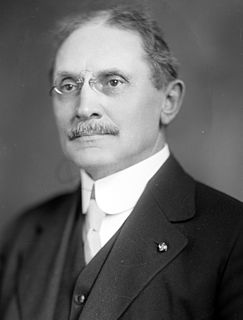
Merrill Moores was a U.S. Representative from Indiana.

William Eastin English was an American attorney and politician, a U.S. Representative from Indiana. He was the son of vice-presidential candidate and businessman, William Hayden English, and his wife Emma Mardulia Jackson.

William Henry Lewis was an American pioneer in athletics, law and politics. Born in Virginia to freedmen, he graduated from Amherst College in Massachusetts, where he also became one of the first African-American college football players. After going to Harvard Law School and continuing to play football, Lewis was the first African American in the sport to be selected as an All-American. In 1903 he was the first African American to be appointed as an Assistant United States Attorney; in 1910 he was the first to be appointed as one of the five United States Assistant Attorneys General, despite opposition by the Southern Democratic block. In 1911 he was among the first African Americans to be admitted to the American Bar Association.
Dock Jackson Jordan was an American lawyer, author, politician, educator, historian and civil rights activist. On July 14, 1917, a letter that Jordan wrote criticizing President Woodrow Wilson's policies on African-Americans and condemning the administration for the East St. Louis Riot was published in the Raleigh Independent. The letter was subsequently published in newspapers throughout the United States and thrust Jordan into national prominence.
Frank Roscoe Beckwith was a lawyer, civil rights activist, and politician from Indianapolis, Indiana. In 1960 he became the first African American to run as a candidate for President of the United States in a major-party primary.
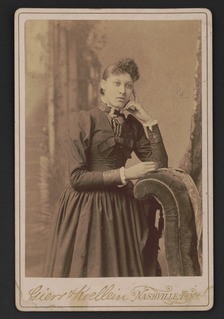
Lillian May Parker Thomas Fox was an African-American journalist, clubwoman, public speaker, and civic activist in Indianapolis, Indiana, who rose to prominence in the 1880s and 1890s as a writer for the Indianapolis Freeman, a leading national black newspaper at the time. In 1900 Fox joined the Indianapolis News, becoming the first African-American columnist to regularly write for a white newspaper in Indiana. She was inducted into the Indiana Journalism Hall of Fame in 2014.
Millard Filmore Singleton was an early black political leader and civil servant in Omaha Nebraska. He was an officer in the Omaha Colored Republican Club and the Omaha branch of the National Afro-American League. He held posts as Justice of the Peace, storekeeper in the United States Internal Revenue Service, recorder of deeds for the city, and as bailiff of the municipal court.

Richard W. Thompson was a journalist and public servant in Indiana and Washington, D.C. He was at various times an editor or managing editor of the Indianapolis Leader, the Indianapolis World, the Indianapolis Freeman and the Washington D.C. Colored American. He was published as a general correspondent in The Colored American, The Washington Post, the Indianapolis Freeman, the Indianapolis World, Atlanta Age, Baltimore Afro-American Ledger, the Cincinnati Rostrum, the Charleston West Virginia Advocate, the Philadelphia Tribune and the Chicago Monitor. His longest lasting relationship was with the Indianapolis Freeman. In 1896, the black paper, The Leavenworth Herald, edited by Blanche Ketene Bruce, called Thompson the "best newspaper correspondent on the colored press."
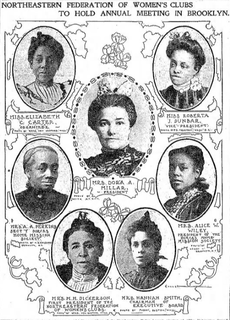
The Northeastern Federation of Colored Women's Clubs (NFCWC) is an umbrella organization representing black women's clubs in the northeastern United States. The organization was affiliated with the National Association of Colored Women's Clubs (NACWC). It was the first umbrella organization for black women's clubs in the United States, predating the NACWC by a month. The motto of the club is "For God and Humanity."
Troy Porter was a plumber, politician, and civil rights leader in Paris, Illinois.

James Matthew Townsend was an African Methodist Episcopal (AME) minister and a state legislator from Indiana. He served in the legislature in the 1884 session. From 1889 to 1891 he was recorder at the General Land Office in Washington, DC, appointed by President Benjamin Harrison.

The Indianapolis Leader began in August 1879 as Indianapolis' first black newspaper.
Harriette Bailey Conn was an American lawyer and politician. A civil rights activist who became known for her efforts assist minorities, women, and defendants in Indiana's criminal justice system, Conn became the first woman and the first African American to serve as Indiana's state public defender in 1970. She also served as Indianapolis' assistant city attorney from 1968 to 1970, and twice won election to the Indiana House of Representatives as a Republican until she resigned her legislative seat to become the state public defender.
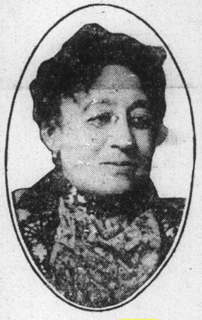
M. Cravath Simpson was an African-American activist and public speaker. After beginning her career as a singer, she studied to become a podiatrist, but is most known for her work to uplift the black community and combat lynching. Though she was based in Boston, Simpson spoke throughout the Northeastern and Midwestern United States urging recognition of the human rights of black citizens.
Robert Lee Brokenburr was an attorney, civil rights leader, and an Indiana State Senator. In 1940, running as a Republican, he became the first African-American elected to the Indiana state legislature, where he served for 20 years. Prior to running for office, Brokenburr worked as counsel and general manager for the Madame C.J. Walker Manufacturing Company while carrying on his own practice litigating civil rights cases.